Fletcher Pratt
| Fletcher Pratt | |
|---|---|
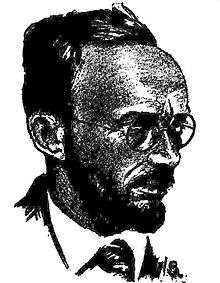 Fletcher Pratt, as pictured in the June 1929 issue of Science Wonder Stories | |
| Born |
April 25, 1897 Buffalo, New York |
| Died |
June 10, 1956 (aged 59) Long Branch, New Jersey, US |
| Pen name | Irvin Lester , George U. Fletcher |
| Occupation | Novelist, historian |
| Nationality | American |
| Genre | Science fiction, fantasy, history |
Murray Fletcher Pratt (1897–1956) was an American writer of science fiction, fantasy and history. He is best known for his works on naval history and on the American Civil War and for fiction written with L. Sprague de Camp.
Life and work
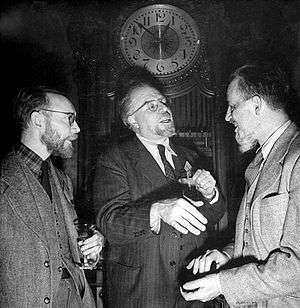
According to de Camp, Pratt was born near Tonawanda, New York, and attended Hobart College for one year. During the 1920s he worked for the Buffalo Courier-Express and for a Staten Island newspaper. In 1926, he married Inga Stephens, an artist.[1] In the late 1920s he began selling stories to pulp magazines. Again, according to de Camp's memoir, when a fire gutted his apartment in the 1930s he used the insurance money to study at the Sorbonne for a year. After that he began writing histories.
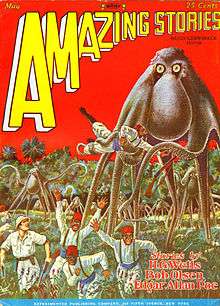
Pratt was a military analyst for Time magazine (whose obituary described him as "bearded, gnome-like" and listed "raising marmosets" among his hobbies),[2] as well as a regular reviewer of historical nonfiction and fantasy and science fiction for the New York Times Book Review.
Wargamers know Pratt as the inventor of a set of rules for naval wargaming before the Second World War. This was known as the "The Fletcher Pratt Naval War Game" and involved dozens of tiny wooden ships, built on a scale of one inch to 50 feet. These were spread over the floor of Pratt's apartment and their maneuvers were calculated via a complex mathematical formula. Noted author and artist Jack Coggins was a frequent participant in Pratt's Navy Game, and de Camp met him through his wargaming group.[3]
Pratt established the literary dining club known as the Trap Door Spiders in 1944. The name is a reference to the exclusive habits of the trapdoor spider, which when it enters its burrow pulls the hatch shut behind it. The club was later fictionalized as the Black Widowers in a series of mystery stories by Isaac Asimov. Pratt himself was fictionalized in one story, "To the Barest", as the Widowers’ founder, Ralph Ottur.
He was also a charter member of The Civil War Round Table of New York, organized in 1951, and served as its president from 1953-1954. In 1956, after his death, the Round Table's board of directors established the Fletcher Pratt Award in his honor, which is presented every May to the author or editor of the best non-fiction book on the Civil War published during the preceding calendar year.[4]
Aside from his historical writings, Pratt is best known for his fantasy collaborations with de Camp, the most famous of which is the humorous Harold Shea series, was eventually published in full as The Complete Compleat Enchanter (1989, ISBN 0-671-69809-5). His solo fantasy novels The Well of the Unicorn and The Blue Star are also highly regarded.
Pratt wrote in a markedly identifiable prose style, reminiscent of the style of Bernard DeVoto. One of his books is dedicated "To Benny DeVoto, who taught me to write."
Several of Pratt's books were illustrated by Inga Stephens Pratt, his wife.
Bibliography
Novels
| Wikisource has original works written by or about: Fletcher Pratt |
- Land of Unreason (1941) with L. Sprague de Camp
- The Carnelian Cube (1948) with L. Sprague de Camp
- The Well of the Unicorn (1948)
- The Blue Star (1952)
- Double Jeopardy (1952)
- The Undying Fire (1953)
- Invaders from Rigel (1960)
- Alien Planet (1962)
Series
Harold Shea
- The Mathematics of Magic: The Enchanter Stories of L. Sprague de Camp and Fletcher Pratt (2007) with L. Sprague de Camp
- The Complete Compleat Enchanter (1989) with L. Sprague de Camp
- The Compleat Enchanter (1975) with L. Sprague de Camp
- * The Incomplete Enchanter (1940) with L. Sprague de Camp
- * The Castle of Iron (1941) with L. Sprague de Camp
- Wall of Serpents [vt The Enchanter Completed (1980 UK)] (1960) with L. Sprague de Camp
Collections
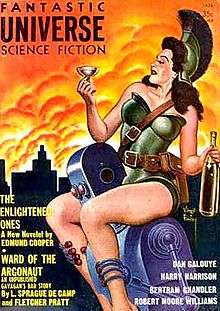
- Double in Space (1951)
- Double Jeopardy (1952)
- Tales from Gavagan's Bar (1953, expanded 1978) with L. Sprague de Camp
Anthologies
- World of Wonder (1951)
Twayne Triplets (edited)
- The Petrified Planet (1952)
- Witches Three (1952)
Nonfiction
- Fletcher Pratt's Naval War Game (1940). A book on the Fletcher Pratt Naval Wargame was printed in 2011. See link
- A Man and His Meals (1947)
- World of Wonder : an Introduction to Imaginative Literature (1951)
Science
- All About Famous Inventors and Their Inventions (1955) illustrated by Rus Anderson
- All About Rockets and Jets (1955) illustrated by Jack Coggins
- Rockets, Jets, Guided Missiles and Spaceships (1951) with Jack Coggins
- By Space Ship to the Moon (1952) with Jack Coggins
- Rockets, Satellites and Space Travel (1958) with Jack Coggins
History and Biography
Naval History
- The Compact History of the United States Navy (1957) OCLC 367782
- Empire and the Sea (1946) with Inga Stephens
- Fighting Ships of the U.S. Navy (1941) illustrated by Jack Coggins
- Fleet Against Japan (1946)
- The Navy has Wings; the United States Naval Aviation (1943)
- The Navy, a History; the Story of a Service in Action (1938)
- The Navy's War (1944)
- Night Work: the Story of Task force 39 (1946) OCLC 1492544
- Preble's Boys; Commodore Preble and the Birth of American Sea Power (1950) LCCN 50-10765
- Sea Power and Today's War (1939) OCLC 1450484
- Ships, Men - and Bases (1941) with Frank Knox
- A Short History of the Army and Navy (1944)
The Napoleonic Wars
- The Empire and the Glory; Napoleon Bonaparte: 1800-1806 (1948)
- Road to Empire; the Life and Times of Bonaparte, the General (1939)
War of 1812
- The Heroic Years; Fourteen Years of the Republic, 1801-1815 (1934)
The Civil War
- The Civil War (1955)
- Civil War in Pictures (1955)
- Civil War on Western Waters (1956)
- The Military Genius of Abraham Lincoln : an Essay (1951) by Colin R. Ballard; introduction by Pratt
- The Monitor and the Merrimac (1951)
- Ordeal by Fire; an Informal History of the Civil War (1935)
- Stanton, Lincoln's Secretary of War (1953)
World War II
- America and Total War (1941)
- The U.S. Army : a Guide to its Men and Equipment (1942) with David Pattee
- What the Citizen Should Know about Modern War (1942)
- The Marines' War, an Account of the Struggle for the Pacific from Both American and Japanese Sources (1948)
- War for the World; a Chronicle of Our Fighting Forces in World War II (1950)
Other
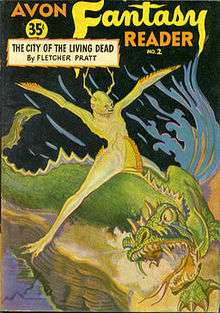
- The Cunning Mulatto and Other Cases of Ellis Parker, American Detective (1935) with Ellis Parker
- Hail, Caesar! (1936)
- The Lost Battalion (1938) with Thomas M. Johnson
- Muscle-power Artillery (1938)
- "The City of the Living Dead" (1939) with Laurence Manning.
- Secret and Urgent; the Story of Codes and Ciphers (1939) OCLC 795019
- My Life to the Destroyers (1944) with L. A. Abercrombie
- Eleven Generals; Studies in American Command (1949)
- The Third King (1950)
- The Battles that Changed History (1956) ISBN 0-486-41129-X
References
- ↑ Preface by David Madden to A Short History of the Civil War: Ordeal by Fire by Fletcher Pratt.
- ↑ ""Milestones", Time, June 18, 1956
- ↑ For further details about the game, including much previously unpublished material, see the Fletcher Pratt Naval Wargame, published in 2011 by the History of Wargaming Project www.wargaming.co
- ↑ Civil War Round Table of New York - The Fletcher Pratt Award
External links
- Works by Fletcher Pratt at Project Gutenberg
- Works by or about Fletcher Pratt at Internet Archive
- Fletcher Pratt at the Internet Speculative Fiction Database
- Bibliography at SciFan
- FantasticFiction — Bibliography and book covers
- Fletcher Pratt at BoardGameGeek
- Fletcher Pratt — Biography and bibliography
- The Naval Wargame The History of Wargaming Project
- New York Times obituary
- Fletcher Pratt Naval & Military Historian at Endless Bookshelf.Net